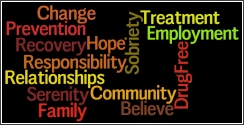 It is good news when an addicted couple find their way into treatment. Opioid addiction is a very lonely journey, and alienating friends and family comes with the territory when one is deep into a drug addiction.
It is good news when an addicted couple find their way into treatment. Opioid addiction is a very lonely journey, and alienating friends and family comes with the territory when one is deep into a drug addiction.
With severe addiction, it is not uncommon for both members of a couple to be struggling with an opiate dependency. While this bond is certainly not a healthy one, it is one that makes sense for the couple, who often find themselves feeling like it’s “us against the world”. As they plow through addiction, sometimes one hour at a time for years, a bond is formed … like two friends going through a war together each watching the other’s back in a never ending fight to stay alive.
At some point, one member of the couple will have the good thought about entering treatment and may push their partner to seek treatment together. Sometimes this works out and sometimes not. When it does work, the couple will begin dosing with methadone or suboxone and hopefully attempt to re-orient themselves to a sober way of living. This is a beautiful experience to behold when two people are ready, and they encourage each other to make better choices.
In 12 Step recovery circles, recovering couples are strongly encouraged to seek their own individual recovery apart from their partner. Couples often resist this suggestion, but it is a very wise approach. It is so easy to relapse when one’s partner goes back to using. So, having one’s own circle of support outside of this relationship can be critical in helping a person to remain drug free when their partner has relapsed. It actually helps the relapsed partner too when he or she sees their spouse not compromising on recovery principles and continuing to make appropriate choices.
With stable couples who have methadone take homes or who receive the same psychotropic medication, there can be the occasional temptation to swap each other’s medications. When they were actively using, they shared works, pills, anything and everything. Now that they’re stable, it may not seem like a big deal to to take a partner’s medication if one has run out or misplaced their own. However, it is a big deal and should be always avoided. Successful recovery is not easy. It requires personal discipline and a strong commitment to do what is right, even when doing the right thing is challenging and difficult.
While couples in treatment can be a complicated affair, it can work and does work everyday around the country. It is important to note that a couple may not progress at the same rate. While one partner stabilizes quickly on methadone and discovers their cravings & withdrawal disappear, the other partner may have uncomfortable withdrawal symptoms and struggle with urges to use illicit drugs for a period of time.
Good methadone programs will strive to support the couple’s mutual effort to be drug free together, but they will also work with each patient separately. This will include being in separate treatment groups and having separate individual counseling sessions.
With private self-pay programs, there are instances in which a couple may not have enough money for each person to dose on a particular day. This can pose a stressful dilemma for the couple and there is often no easy answer. One member of the couple may just go without. While there is typically an apprehension that missing a day of dosing will bring about immediate withdrawal sickness, this is often not the case. Since methadone has a long half life and is designed for extended duration, some people discover that they are comfortably maintained even through a missed day of dosing. This is not a recommended practice since missing doses is often correlated with illicit drug use, but it is an interesting and useful piece of information.
In the final analysis, a “couple” can suffer for years with simultaneous opioid addictions and a severely compromised quality of life. Choosing to enter drug treatment, either as a couple or as separate individuals, is a positive decision that should be supported wholeheartedly by family, friends, employers, recovery self-help programs, and the treatment community.

 Follow
Follow

 The U.S. has experienced a steady rise in the number of people being prescribed opioids and in the number of individuals becoming physically addicted to these medications. In the 1970’s and 1980’s, the typical methadone program client was someone who had graduated to daily IV heroin use.
The U.S. has experienced a steady rise in the number of people being prescribed opioids and in the number of individuals becoming physically addicted to these medications. In the 1970’s and 1980’s, the typical methadone program client was someone who had graduated to daily IV heroin use. To be curious is a basic part of human nature. We live each day naturally drawn to things which interest us, which feel good physically or emotionally, or which might incite some curious inclination down inside of us. It is literally wired into the human DNA to be inquisitive and to seek new experiences.
To be curious is a basic part of human nature. We live each day naturally drawn to things which interest us, which feel good physically or emotionally, or which might incite some curious inclination down inside of us. It is literally wired into the human DNA to be inquisitive and to seek new experiences. Addiction is an uphill battle. We have heard this said many times before. Many who found themselves in the midst of a personal opioid addiction were swept along on a nightmarish roller coaster ride with seemingly no brake pedal within reach.
Addiction is an uphill battle. We have heard this said many times before. Many who found themselves in the midst of a personal opioid addiction were swept along on a nightmarish roller coaster ride with seemingly no brake pedal within reach. Recovery is for everyone and anyone with a genuine desire for change. Treatment in a methadone program offers the potential for change, and a new path which can lead to a much improved life.
Recovery is for everyone and anyone with a genuine desire for change. Treatment in a methadone program offers the potential for change, and a new path which can lead to a much improved life.


